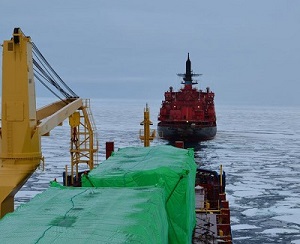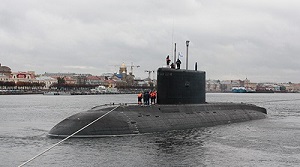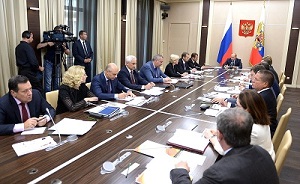Russian Sanctions at Work
Op-Ed: The Week in Review
In some ways, it’s business as usual in sanctioned Russia.
 BBC Chartering reports that its vessel BBC Louisiana just completed a project supporting the expansion of the Antipinsky Refinery in Tyumen, located on the Tura River 2,500 kilometers (1,600 miles) east of Moscow in Western Siberia. BBC Chartering was contracted to deliver the refinery’s continuous catalyst regeneration modules. Theses had to be shipped from Mokpo, South Korea, to Novyy Port, at the mouth of the River Ob in the Arctic Sea.
BBC Chartering reports that its vessel BBC Louisiana just completed a project supporting the expansion of the Antipinsky Refinery in Tyumen, located on the Tura River 2,500 kilometers (1,600 miles) east of Moscow in Western Siberia. BBC Chartering was contracted to deliver the refinery’s continuous catalyst regeneration modules. Theses had to be shipped from Mokpo, South Korea, to Novyy Port, at the mouth of the River Ob in the Arctic Sea.
The latest Western sanctions, imposed earlier this month, have targeted technology for Russia's Arctic oil exploration and shale oil projects, and Russia reportedly fears sanctions which may aim at technology needed to modernize its oil refineries. This could lead to gasoline shortages.
Sanctions have limited the ability of Russian companies to borrow from Western capital markets and have hit Rosneft, Russia’s top oil producer, especially hard. The company has had to cut its staff as production falls.
Russia is particularly dependent on the West for catalysts, refining equipment and gas turbine parts, meaning complicated refinery modernization work to improve fuel quality is seen as almost impossible without access to Western expertise.
Offshore spare parts
The sanctions are creating fears that what is already a humanitarian crisis in the Ukraine will become both a humanitarian and environmental crisis across the region.
The Barents Observer reports the Russian Ministry of Energy as openly expressing concern about safety, security and progress in offshore development as a result of a lack of spare parts.
According to the ministry, Russian companies might lack as many as 150,000 components needed for offshore platforms by 2020, the newspaper Kommersant reports. This could compromise safety at existing installations such as those at Sakhalin in the east and the Prirazlomnoye field in the Pechora Sea.
According to media reports, 68 percent of the technical equipment needed by the industry is now subject to sanctions and consequently out of reach.
Mistral deal
However, the news is not all bad for Russia. Russia has received double the value of the original Mistral warship deal after France paid the deal out. The bonus is due to the sharp devaluation of the Russian currency, Russia’s Minister of Trade and Industry, Denis Manturov, said last week.
The 2011 contract on the delivery of two Mistral-class helicopter carriers was officially terminated in August over Russia's alleged participation in the Ukraine conflict, with France paying Russia around $1 billion in compensation.
Yards Keep Producing
 Russia’s homegrown maritime industries are continuing to produce. The navy’s second diesel-electric submarine, Vladikavkaz, will be ready to become part of the Black Sea Fleet by the end of the year – ahead of schedule. The first submarine, Novorossiysk, and the third, Stary Oskol, will also be joined by the fourth, Krasnodar, by the end of the year.
Russia’s homegrown maritime industries are continuing to produce. The navy’s second diesel-electric submarine, Vladikavkaz, will be ready to become part of the Black Sea Fleet by the end of the year – ahead of schedule. The first submarine, Novorossiysk, and the third, Stary Oskol, will also be joined by the fourth, Krasnodar, by the end of the year.
Russia’s new frigate, Admiral Gorshkov, is currently making its maiden voyage, heading northward to engage in test shooting in the White Sea. The 4,500-ton vessel was built at the Northern Yard in St. Petersburg and is the biggest naval vessel built in Russia in almost two decades.
St. Petersburg saw the official flag-raising ceremony for the icebreaker Vladivostok last week. Vladivostok is the lead vessel in the series of three diesel-electric icebreakers built for FSUE Rosmorport and classed by the Russian Maritime Register of Shipping.
Politics and Power
Political tensions in the region are rising. The Medi Telegraph reported last week that Russia would be forced to take counter measures to restore the balance of power in Europe if media reports that the U.S. plans to upgrade its nuclear presence in Germany are true.
Russia may deploy Iskander ballistic missiles to its enclave Kaliningrad if the U.S. proceeds, German media reported a military source as saying.
On other fronts, the U.S. and Russian governments are more amicable. They signed a bilateral agreement this month to combat illegal, unregulated and unreported fishing in the Bering Sea. Illegal fishing there damages Alaska disproportionately as the primary seafood-producing state for domestic consumption and one of the largest seafood producers in the world.
U.S. President Barack Obama will meet with Russian President Vladimir Putin this week while both men are in New York for the United Nations General Assembly. The meeting is apparently at Putin's request.
“Given the situations in Ukraine and Syria, despite our profound differences with Moscow, the president believes that it would be irresponsible not to test whether we can make progress through high-level engagement with the Russians,” a U.S. official said.
“President Obama will take advantage of this meeting to discuss Ukraine, and he will be focused on ensuring Moscow lives up to the Minsk commitments. This will be the core message of this bilateral engagement.”
 Budget Plans
Budget Plans
Meanwhile, Putin is continuing with business at home. At a budget planning meeting last week he said, “Today, I propose that we focus on the fiscal policy for next year, discuss key outcomes and, of course, reach concrete decisions on the federal budget’s main parameters. The planned budget deficit for next year should not exceed three percent of GDP. This is one of the most important benchmarks for the cabinet during the budget process… Let’s get to work.”
A business-as-usual approach, however, is not so easy for those suffering through the war in the Ukraine. The video below, released on YouTube last week, shows children describing the effects of the ongoing bombing. Sanctions or not, the situation is yet to be resolved peacefully.
The opinions expressed herein are the author's and not necessarily those of The Maritime Executive.
